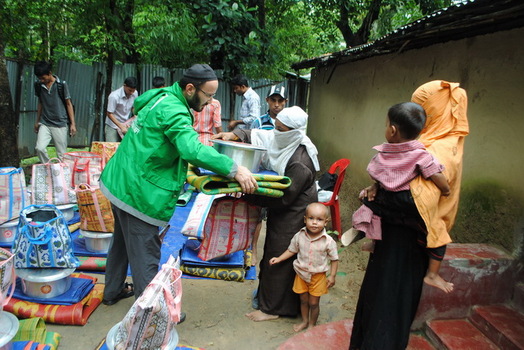
IHH teams do not only provide accommodation, food, healthcare services etc. to the Arakanese refugees but they also provide them with emergency aid items as they left all they have back in Arakan.
IHH, which has been working since 1995 to address the problems of Arakanese people and bring their problems to the world’s attention, set up a crisis desk in the region just after the outbreak of the incidents. IHH aid teams firstly delivered food and cash money to the Arakanese refugees in Bangladesh.
A total of 33,000 people benefited from the delivery of food packages in refugee camps and neighboring villages. In addition to this, special emergency aid packages were prepared for the Arakanese people who have just arrived in the refugee camps. These packages which were delivered to 3,000 families included medicine, cleaning supplies, canvas, blankets, mosquito nets, clothes, kitchen utensils, rice, sugar, salt, milk powder, cooking oil, flour, Semai (a local food), potatoes, chickpea and some cash money.
Aqiqah and nazhr animals slaughtered, meat delivered to 4,890 families
In addition, animals donated to the IHH to be sacrificed as aqiqah and nazhr have been slaughtered and delivered to Rohingya Muslims. The meat of the animals was delivered to 4,890 families in refugee camps and surrounding villages .
Migration to refugee camps on the Bangladesh-Myanmar border continues as the pressure and attacks on Arakanese Muslims go on. The Arakanese Muslims who flee the massacre are trying to reach the refugee camps by crossing the Naf River on the border on boats. The survivors of this challenging trip face dire circumstances in the refugee camps.
Please click to have a look at IHH’s report on Arakan which includes detailed information about the region.
Click for Online Donation
Click for Bank Account Numbers